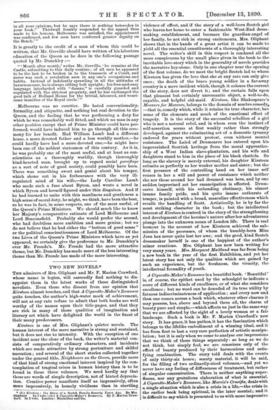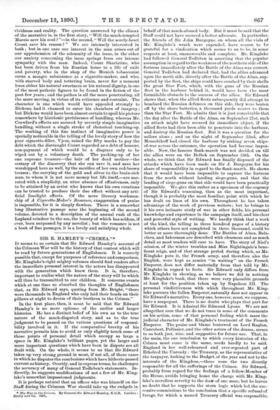TWO NEW NOVELS.*
THE admirers of Mrs. Oliphant and Mr. F. Marion Crawford, whose name is legion, will assuredly find nothing to dis- appoint them in the latest works of these distinguished novelists. Even those who dissent from our opinion that Kirsteen almost touches, and that A Cigarette-Maker's Romance quite touches, the author's high-water mark of achievement, will not at any rate refuse to admit that both books are well worthy of the names upon their title-pages, and that they are rich in many of those qualities of imagination and literary art which have delighted the world in the finest of their many predecessors,
Kirsteen is one of Mrs. Oliphant's quieter novels. The human interest of the mere narrative is strong and sustained, but it does not rise to intensity. With the exception of one incident near the close of the book, the writer's material con- sists of comparatively ordinary characters, and incidents which are made attractive by strong portraiture and skilful narration ; and several of the short stories collected together under the general title, Neighbours on the Green, provide more of that kind of strong emotional interest inspired by the con- templation of tragical crises in human history than is to be found in these three volumes. We need hardly say that these are words of simple description. not of hinted deprecia- tion. Creative power manifests itself as impressively, often more impressively, in homely vividness than in startling
• (1.) %intent : the Story of a Scotch "'amity Seventy Years Ago. By Mrs Oliphant In 3 vola —(2 A Cigarette-Maker's Romance. By F. Marion Craw- ford. In 2 vole. London ; Macmillan and Co.
violence of effect, and if the story of a well-born Scotch girl who leaves her home to enter a fashionable West-End dress- making establishment, and becomes the guardian-angel of her family, be not rich in strong excitements, Mrs. Oliphant shows that in the hands of a great artist it can be made to.
yield all the essential constituents of a thoroughly interesting novel. The writer's skill in this respect is rendered all the more conspicuous by the small place given in the book to the inevitable love-story which in the generality of novels provides the narrative key-stone. Only in one chapter near the opening of the first volume, do we meet the bright Scotch lad to whom
Kirsteen has given the love that she at any rate can only give once; the death of the brave young soldier in a far-away country is a mere incident which, though it colours the current of the story, does not divert it; and the curtain falls upon that pleasant but certainly unromantic object, a well-to-do, capable, and helpful old-maid. .Kirsteen, like Shakespeare's Measure for Measure, belongs to the domain of sombre comedy,
—that is, comedy which, while it retains its true character, has some of the elements and much of the emotional effect of tragedy. It is the story of the successful rebellion of a girl who is not a natural rebel, and in whom even the instinct of self-assertion seems at first weakly rather than strongly developed, against the culminating act of a domestic tyranny
endured for years without protest, even without mental resistance. The Laird of Drumoarro has entered upon his
impoverished Scottish heritage from the moral apprentice- ship of a West Indian slave-plantation, and his wife and daughters stand to him in the place of his black chattels. So long as the slavery is merely external, his daughter Kirsteen submits as perfectly as her weaker mother and sister; but the first pressure of the controlling hand on her inner self rouses in her a will and power of resistance which neither she nor those around her had dreamed was hers, and by one sudden improvised act her emancipation is effected. Drum- carro himself, with his unbending obstinacy, his almost insane family pride, and his quite insane outbursts of temper, is painted with a broad, masculine effectiveness which recalls the handling of Scott. Artistically, he is by far the most striking character in the book ; but the intellectual interest of Kirsteen is centred in the story of the strengthening and development of the heroine's nature after her adventurous plunge into the unknown ocean of London life. There is real humour in the account of how Kirsteen achieved the sub- mission of the peeresses, of whom the humbly-born Miss Jean has never quite lost her awe; and the good, kind Scotch dressmaker herself is one of the happiest of the author's minor creations. Mrs. Oliphant has now been writing for very many years. Mrs. Margaret Maitland was far from being a new book in the year of the first Exhibition, and yet her latest story has not only the qualities which are gained by such an experience, but the freshness, the vivacity, the intellectual fecundity of youth.
A Cigarette-Maker's Romance is a beautiful book. Beautiful is, of course, the epithet used by the schoolgirl to indicate a score of different kinds of excellence, or of what she considers excellence ; but no word can be denuded of its true utility by fatuous indiscriminateness of application ; and every now and then one comes across a book which, whatever other charms it may possess, has, above and beyond them all, the charm of beauty pure and simple,—which affects us just in the same way that we are affected by the sight of a lovely woman or a fair landscape. Such a book is Mr. F. Marion Crawford's new story. It has grace, it has pathos, it has the fascination which belongs to the lifelike embodiment of a winning ideal, and it has from first to last a very rare perfection of artistic manipu- lation; but it is only when we come to analyse our impressions that we think of these things separately: so long as we do not think, but simply feel, we are conscious only of the effect of beauty produced by their harmonious and satis- fying combination. The story told deals with the events of only thirty-six hours; scanty material, it will be said, for the filling of two ordinarily-sized volumes,—and yet we never have any feeling of diffuseness of treatment, but rather of singular concentration. There is neither anything super- fluous, nor any gratuitous elaboration of what is essential. A Cigarette-Maker's Romance, like Marzio's Crucifix, deals with a single situation which is also a crisis in a life,,—the crisis in the earlier book being spiritual, in the later mental; and it is difficult to say which is presented to us with more impressive
vividness and reality. The question answered by the climax of the narrative is. in the first story, " Will the much-tempted Marzio save his soul P "—in the second, " Will the sorely-beset Count save his reason ? " We are intensely interested in both ; but in one case our interest in the man arises out of our apprehension of the solemnity of the issue, in the other our anxiety concerning the issue springs from our intense sympathy with the man. Indeed, Count Skariatine, who has been driven from his Russian home to a life of exile and poverty, who in the shop of the Munich tobacconist earns a meagre subsistence as a cigarette-maker, and who, with starved body and tottering brain, never for a moment loses either his natural sweetness or his natural dignity, is one of the most pathetic figures to be found in the fiction of the past few years ; and the pathos is all the more penetrating, all the more moving, in virtue of its reticence and restraint. The character is one which would have appealed strongly to Dickens, had it chanced to enter his chambers of imagery ; but Dickens would have been almost certain to spoil his picture somewhere by histrionic prettinesses of handling, whereas Mr. Crawford's effects are secured by severely simple imaginative handling, without a single stroke of rhetorical touching-up. The working of this fine instinct of imaginative power is specially noticeable in the telling of the lovely story of how the poor cigarette-filler, Vjera, raised the fifty marks to pay the debt which the distraught Count regarded as a debt of honour, non-payment of which would be a disgrace only to be wiped out by a voluntary death. The packing-up of her one supreme treasure—the hair of her dead mother—the ecstasy of the discovery that she can save it, and save her worshipped hero as well, by the sacrifice of her own red-brown tresses ; the carrying of the gold and silver to the brain-sick man, to whom it is not mere money but life itself,—are nar- rated with a simplicity, an utter absence of effusiveness, only to be attained by an artist who knows that his own creations can be trusted to produce their due effect without any arti- ficial limelight effects. Of the mere literary workman- ship of A Cigarette-Maker's Romance, exaggeration of praise is impossible, for it is simply flawless. There is a somewhat long illustrative passage near the beginning of the second volume, devoted to a description of the annual rush of the Lapland reindeer to the sea, the beauty of which has seldom, if ever, been surpassed by any novelist ; but the romance is not a book of fine passages, it is a lovely and satisfying whole.











































 Previous page
Previous page